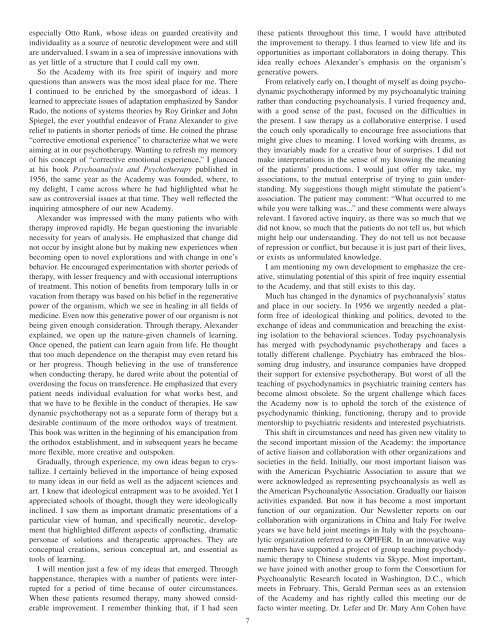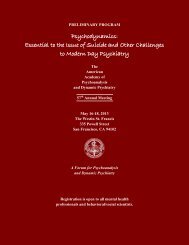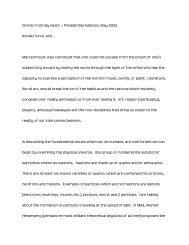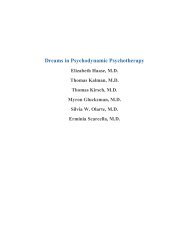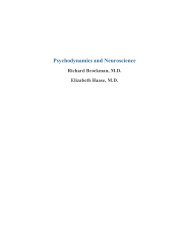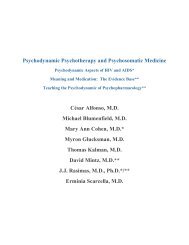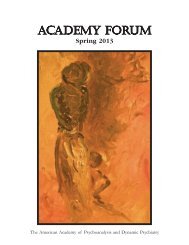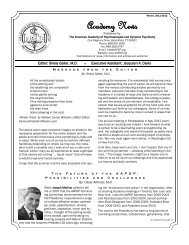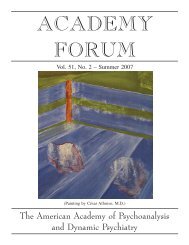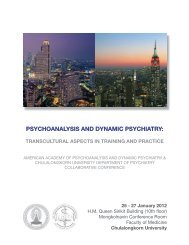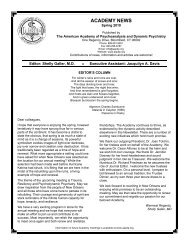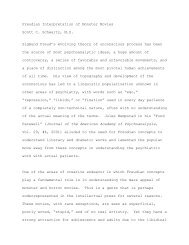ACADEMY FORUM - The American Academy of Psychoanalysis and Dynamic ...
ACADEMY FORUM - The American Academy of Psychoanalysis and Dynamic ...
ACADEMY FORUM - The American Academy of Psychoanalysis and Dynamic ...
You also want an ePaper? Increase the reach of your titles
YUMPU automatically turns print PDFs into web optimized ePapers that Google loves.
especially Otto Rank, whose ideas on guarded creativity <strong>and</strong><br />
individuality as a source <strong>of</strong> neurotic development were <strong>and</strong> still<br />
are undervalued. I swam in a sea <strong>of</strong> impressive innovations with<br />
as yet little <strong>of</strong> a structure that I could call my own.<br />
So the <strong>Academy</strong> with its free spirit <strong>of</strong> inquiry <strong>and</strong> more<br />
questions than answers was the most ideal place for me. <strong>The</strong>re<br />
I continued to be enriched by the smorgasbord <strong>of</strong> ideas. I<br />
learned to appreciate issues <strong>of</strong> adaptation emphasized by S<strong>and</strong>or<br />
Rado, the notions <strong>of</strong> systems theories by Roy Grinker <strong>and</strong> John<br />
Spiegel, the ever youthful endeavor <strong>of</strong> Franz Alex<strong>and</strong>er to give<br />
relief to patients in shorter periods <strong>of</strong> time. He coined the phrase<br />
“corrective emotional experience” to characterize what we were<br />
aiming at in our psychotherapy. Wanting to refresh my memory<br />
<strong>of</strong> his concept <strong>of</strong> “corrective emotional experience,” I glanced<br />
at his book <strong>Psychoanalysis</strong> <strong>and</strong> Psychotherapy published in<br />
1956, the same year as the <strong>Academy</strong> was founded, where, to<br />
my delight, I came across where he had highlighted what he<br />
saw as controversial issues at that time. <strong>The</strong>y well reflected the<br />
inquiring atmosphere <strong>of</strong> our new <strong>Academy</strong>.<br />
Alex<strong>and</strong>er was impressed with the many patients who with<br />
therapy improved rapidly. He began questioning the invariable<br />
necessity for years <strong>of</strong> analysis. He emphasized that change did<br />
not occur by insight alone but by making new experiences when<br />
becoming open to novel explorations <strong>and</strong> with change in one’s<br />
behavior. He encouraged experimentation with shorter periods <strong>of</strong><br />
therapy, with lesser frequency <strong>and</strong> with occasional interruptions<br />
<strong>of</strong> treatment. This notion <strong>of</strong> benefits from temporary lulls in or<br />
vacation from therapy was based on his belief in the regenerative<br />
power <strong>of</strong> the organism, which we see in healing in all fields <strong>of</strong><br />
medicine. Even now this generative power <strong>of</strong> our organism is not<br />
being given enough consideration. Through therapy, Alex<strong>and</strong>er<br />
explained, we open up the nature-given channels <strong>of</strong> learning.<br />
Once opened, the patient can learn again from life. He thought<br />
that too much dependence on the therapist may even retard his<br />
or her progress. Though believing in the use <strong>of</strong> transference<br />
when conducting therapy, he dared write about the potential <strong>of</strong><br />
overdosing the focus on transference. He emphasized that every<br />
patient needs individual evaluation for what works best, <strong>and</strong><br />
that we have to be flexible in the conduct <strong>of</strong> therapies. He saw<br />
dynamic psychotherapy not as a separate form <strong>of</strong> therapy but a<br />
desirable continuum <strong>of</strong> the more orthodox ways <strong>of</strong> treatment.<br />
This book was written in the beginning <strong>of</strong> his emancipation from<br />
the orthodox establishment, <strong>and</strong> in subsequent years he became<br />
more flexible, more creative <strong>and</strong> outspoken.<br />
Gradually, through experience, my own ideas began to crystallize.<br />
I certainly believed in the importance <strong>of</strong> being exposed<br />
to many ideas in our field as well as the adjacent sciences <strong>and</strong><br />
art. I knew that ideological entrapment was to be avoided. Yet I<br />
appreciated schools <strong>of</strong> thought, though they were ideologically<br />
inclined. I saw them as important dramatic presentations <strong>of</strong> a<br />
particular view <strong>of</strong> human, <strong>and</strong> specifically neurotic, development<br />
that highlighted different aspects <strong>of</strong> conflicting, dramatic<br />
personae <strong>of</strong> solutions <strong>and</strong> therapeutic approaches. <strong>The</strong>y are<br />
conceptual creations, serious conceptual art, <strong>and</strong> essential as<br />
tools <strong>of</strong> learning.<br />
I will mention just a few <strong>of</strong> my ideas that emerged. Through<br />
happenstance, therapies with a number <strong>of</strong> patients were interrupted<br />
for a period <strong>of</strong> time because <strong>of</strong> outer circumstances.<br />
When these patients resumed therapy, many showed considerable<br />
improvement. I remember thinking that, if I had seen<br />
7<br />
these patients throughout this time, I would have attributed<br />
the improvement to therapy. I thus learned to view life <strong>and</strong> its<br />
opportunities as important collaborators in doing therapy. This<br />
idea really echoes Alex<strong>and</strong>er’s emphasis on the organism’s<br />
generative powers.<br />
From relatively early on, I thought <strong>of</strong> myself as doing psychodynamic<br />
psychotherapy informed by my psychoanalytic training<br />
rather than conducting psychoanalysis. I varied frequency <strong>and</strong>,<br />
with a good sense <strong>of</strong> the past, focused on the difficulties in<br />
the present. I saw therapy as a collaborative enterprise. I used<br />
the couch only sporadically to encourage free associations that<br />
might give clues to meaning. I loved working with dreams, as<br />
they invariably made for a creative hour <strong>of</strong> surprises. I did not<br />
make interpretations in the sense <strong>of</strong> my knowing the meaning<br />
<strong>of</strong> the patients’ productions. I would just <strong>of</strong>fer my take, my<br />
associations, to the mutual enterprise <strong>of</strong> trying to gain underst<strong>and</strong>ing.<br />
My suggestions though might stimulate the patient’s<br />
association. <strong>The</strong> patient may comment: “What occurred to me<br />
while you were talking was...” <strong>and</strong> these comments were always<br />
relevant. I favored active inquiry, as there was so much that we<br />
did not know, so much that the patients do not tell us, but which<br />
might help our underst<strong>and</strong>ing. <strong>The</strong>y do not tell us not because<br />
<strong>of</strong> repression or conflict, but because it is just part <strong>of</strong> their lives,<br />
or exists as unformulated knowledge.<br />
I am mentioning my own development to emphasize the creative,<br />
stimulating potential <strong>of</strong> this spirit <strong>of</strong> free inquiry essential<br />
to the <strong>Academy</strong>, <strong>and</strong> that still exists to this day.<br />
Much has changed in the dynamics <strong>of</strong> psychoanalysis’ status<br />
<strong>and</strong> place in our society. In 1956 we urgently needed a platform<br />
free <strong>of</strong> ideological thinking <strong>and</strong> politics, devoted to the<br />
exchange <strong>of</strong> ideas <strong>and</strong> communication <strong>and</strong> breaching the existing<br />
isolation to the behavioral sciences. Today psychoanalysis<br />
has merged with psychodynamic psychotherapy <strong>and</strong> faces a<br />
totally different challenge. Psychiatry has embraced the blossoming<br />
drug industry, <strong>and</strong> insurance companies have dropped<br />
their support for extensive psychotherapy. But worst <strong>of</strong> all the<br />
teaching <strong>of</strong> psychodynamics in psychiatric training centers has<br />
become almost obsolete. So the urgent challenge which faces<br />
the <strong>Academy</strong> now is to uphold the torch <strong>of</strong> the existence <strong>of</strong><br />
psychodynamic thinking, functioning, therapy <strong>and</strong> to provide<br />
mentorship to psychiatric residents <strong>and</strong> interested psychiatrists.<br />
This shift in circumstances <strong>and</strong> need has given new vitality to<br />
the second important mission <strong>of</strong> the <strong>Academy</strong>: the importance<br />
<strong>of</strong> active liaison <strong>and</strong> collaboration with other organizations <strong>and</strong><br />
societies in the field. Initially, our most important liaison was<br />
with the <strong>American</strong> Psychiatric Association to assure that we<br />
were acknowledged as representing psychoanalysis as well as<br />
the <strong>American</strong> Psychoanalytic Association. Gradually our liaison<br />
activities exp<strong>and</strong>ed. But now it has become a most important<br />
function <strong>of</strong> our organization. Our Newsletter reports on our<br />
collaboration with organizations in China <strong>and</strong> Italy For twelve<br />
years we have held joint meetings in Italy with the psychoanalytic<br />
organization referred to as OPIFER. In an innovative way<br />
members have supported a project <strong>of</strong> group teaching psychodynamic<br />
therapy to Chinese students via Skype. Most important,<br />
we have joined with another group to form the Consortium for<br />
Psychoanalytic Research located in Washington, D.C., which<br />
meets in February. This, Gerald Perman sees as an extension<br />
<strong>of</strong> the <strong>Academy</strong> <strong>and</strong> has rightly called this meeting our de<br />
facto winter meeting. Dr. Lefer <strong>and</strong> Dr. Mary Ann Cohen have


